If you’re considering installing a home security system, it’s important to weigh the various factors that can impact the overall cost. From the type of system you choose to the level of automation you desire, there are several key considerations to keep in mind. This article will discuss home automation ideas, different types of lighting options, and delve into the installation costs involved in setting up a home security system. By understanding these factors, you can make an informed decision that not only enhances the safety of your home but also fits within your budget.
Types of Home Security Systems
When it comes to protecting your home and ensuring the safety of your loved ones, investing in a home security system is a wise choice. There are several types of home security systems available in the market, each with its own set of features and benefits.
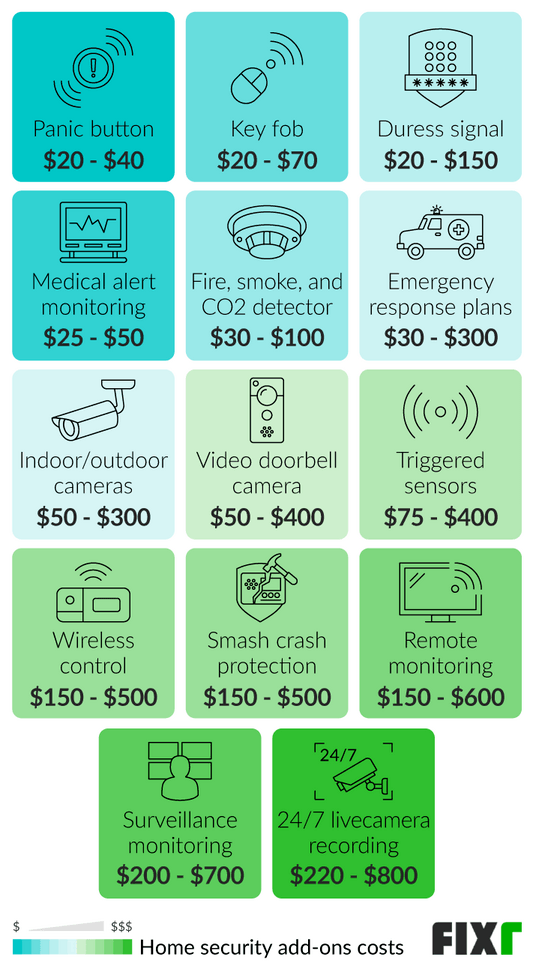
Standard Alarm Systems
Standard alarm systems are the traditional type of home security system that includes sensors on doors and windows, as well as a control panel and an alarm. When a sensor is triggered, it sets off a loud alarm to alert you and your neighbors of a potential break-in. These systems are typically effective and provide a basic level of security for your home.
Monitored Alarm Systems
Monitored alarm systems take home security a step further by adding 24/7 professional monitoring to the equation. When an alarm is triggered, a signal is sent to a monitoring center where trained professionals will assess the situation and take appropriate action, such as contacting emergency services if necessary. This type of system offers an added layer of protection and peace of mind.
Wireless Alarm Systems
Wireless alarm systems have gained popularity in recent years due to their convenience and versatility. These systems operate using wireless technology, eliminating the need for messy and cumbersome wiring. Wireless alarm systems are easy to install and can be easily moved or expanded as needed. They offer flexibility and convenience without compromising on security.
Smart Home Security Systems
Smart home security systems have revolutionized the way we protect our homes. These systems integrate with your existing home automation tools and enable you to control and monitor your security system remotely using your smartphone or other connected devices. Smart home security systems offer advanced features such as remote access, video surveillance, and real-time notifications, making them a popular choice for tech-savvy homeowners.
Cost of Home Security Systems
Now that we have discussed the different types of home security systems available, let’s delve into the cost aspects associated with installing and maintaining these systems. It’s important to consider the various expenses involved to make an informed decision that meets your budget and security needs.
Upfront Purchase Price
The upfront purchase price of a home security system includes the cost of the equipment itself. Each type of system will have a different price range, with more advanced and feature-rich systems typically being more expensive. It’s important to balance your budget with the level of security and features you require to ensure you are getting the best value for your investment.
Installation Costs
Installation costs can vary depending on whether you opt for a professional installation or choose to install the system yourself. Professional installation ensures proper installation and configuration of the system, but it often comes with an additional fee. On the other hand, DIY installation can save you money, but it’s essential to carefully follow the instructions to avoid any mishaps or security vulnerabilities.
Monitoring Fees
For monitored alarm systems, monitoring fees are an ongoing expense. These fees cover the cost of 24/7 professional monitoring services that respond to alarm activations. The cost of monitoring fees will vary depending on the security company and the level of service you choose. It’s important to carefully evaluate the monitoring services offered and choose one that best suits your needs and budget.
Maintenance Costs
Just like any other electronic system, home security systems require regular maintenance to ensure they are operating at their optimal level. Maintenance costs can include routine inspections, battery replacements, and software updates. These costs should be factored into your overall budget to ensure your system remains reliable and effective in the long run.
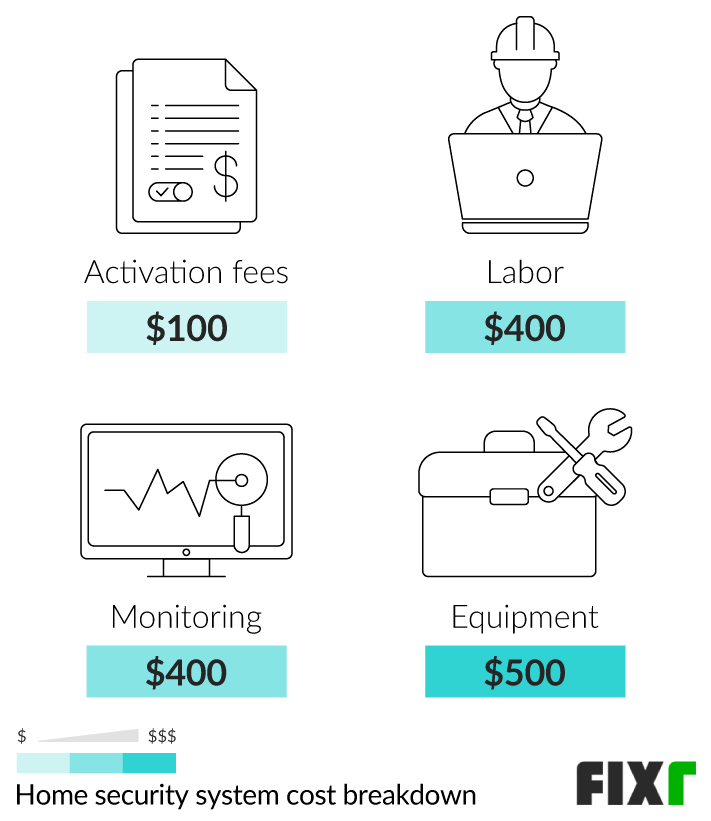
Additional Technology Costs
While the core components of a home security system are usually included in the initial purchase price, additional technology costs may arise if you choose to expand or upgrade your system. This could include adding extra sensors, cameras, or integrating other smart home devices. It’s important to consider these potential costs when making your initial purchase to ensure compatibility and future scalability.
Factors Affecting Home Security System Installation Cost
The installation cost of a home security system can vary based on several factors. Understanding these factors will help you determine the potential installation cost for your specific requirements.
Size of the Property
The size of your property plays a significant role in the installation cost of a home security system. Larger properties may require more sensors, cameras, and other equipment to provide comprehensive coverage. This can lead to higher installation costs compared to smaller properties.
Complexity of the System
The complexity of the home security system you choose will also impact the installation cost. Systems with more advanced features and integration capabilities may require additional time and expertise to install properly. The more complex the system, the higher the installation cost may be.
Quality of the Equipment
The quality of the equipment you select will play a role in the installation cost as well. Higher-quality equipment may come at a premium price, but it often provides better reliability and performance. Investing in quality equipment can be a cost-effective decision in the long run, as it may require less maintenance and have a longer lifespan.
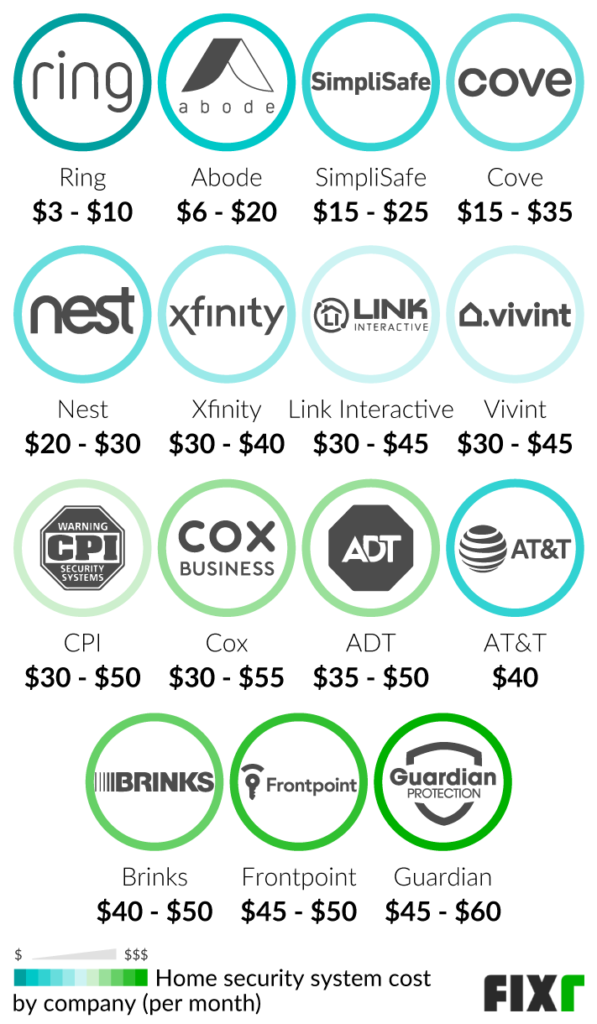
Professional or DIY Installation
The choice between professional installation and DIY installation can also affect the overall installation cost. Professional installation ensures that the system is installed correctly and optimally, but it usually comes with an additional fee. DIY installation can save you money upfront, but it’s important to have the necessary skills and knowledge to install the system properly to avoid any potential issues or security vulnerabilities.
Average Range of Home Security System Installation Costs
Home security system installation costs can vary widely depending on the factors mentioned earlier. Here’s a breakdown of the average range of costs you can expect for different options:
Low-End Options
Low-end home security systems, such as basic standard alarm systems, tend to have lower upfront purchase prices and installation costs. These systems provide essential security features without all the bells and whistles. You can expect the average installation cost for a low-end system to range from $100 to $500, depending on the size of your property and any additional equipment or features you choose.
Mid-Range Options
Mid-range home security systems, which may include monitored alarm systems or wireless systems, offer more advanced features and increased peace of mind. The installation cost for a mid-range system typically falls in the range of $500 to $1,500, again depending on the size of your property and the specific features you select.
High-End Options
High-end home security systems, such as smart home security systems with integration capabilities and advanced automation features, come at a premium cost. These systems often require professional installation and can range in cost from $1,500 to $5,000 or more, depending on the complexity and scope of the installation.
Home Automation and Security
Integrating your home security system with home automation tools can enhance the functionality and convenience of both systems. Let’s explore the relationship between home automation and security, as well as the cost implications involved.
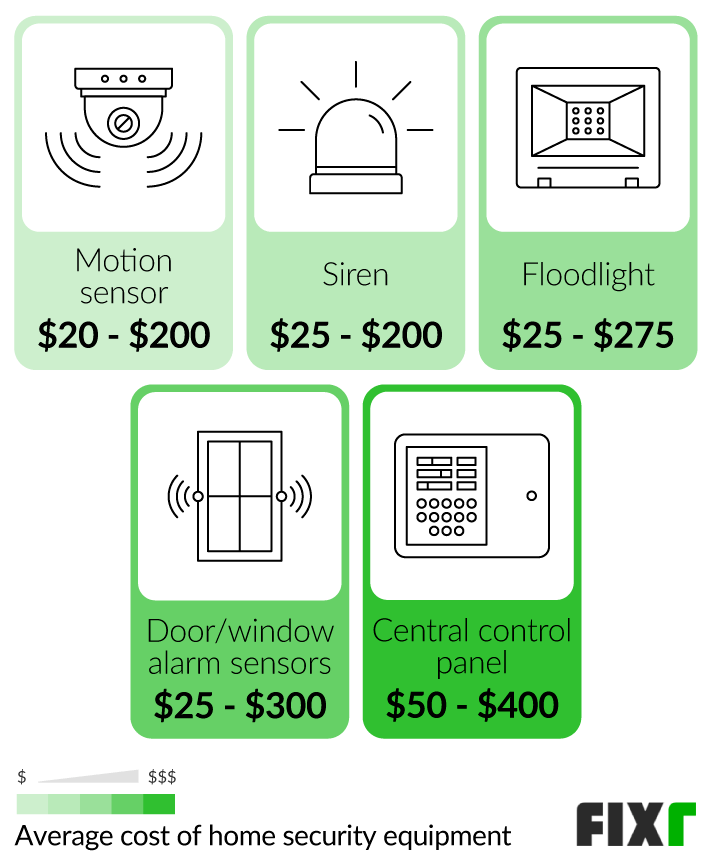
Integration with Home Automation Tools
Smart home security systems can seamlessly integrate with various home automation tools and devices. This integration allows you to control and monitor your security system alongside other smart devices, such as thermostats, lights, and door locks. The ability to control all these systems from a single interface adds convenience and simplifies the management of your home. However, it’s important to note that integrating your security system with home automation tools may require additional equipment or software, which can increase the overall cost.
Smart Home Automation Ideas
Integrating your home security system with smart home automation opens up a world of possibilities. Here are some smart home automation ideas that can enhance your security system and improve your overall home experience:
-
Automated Lighting: Program your lights to turn on and off at specific times or activate in response to different events, such as an alarm activation. This creates the illusion of occupancy and deters potential intruders.
-
Remote Access: Control your security system, surveillance cameras, and other smart devices from anywhere in the world using your smartphone or other connected devices. This allows you to monitor your home and make adjustments as needed, even when you’re not physically present.
-
Smart Locks: Integrate your home security system with smart locks to remotely lock and unlock doors, as well as monitor access to your home. You can provide temporary access codes for guests or service providers and receive notifications whenever someone enters or exits your home.
-
Voice Control: Connect your security system to voice-controlled devices, such as Amazon Alexa or Google Home, to control your security system with voice commands. This adds convenience and allows for hands-free operation of your security system.
Cost Implication of Home Automation
While home automation can enhance the functionality and convenience of your security system, it’s important to consider the cost implications. Integrating your security system with home automation tools may require additional equipment or software, which can increase the overall cost of your home security setup. However, many homeowners find that the added convenience and peace of mind are well worth the investment.
Additional Features and Their Costs
In addition to the core components of a home security system, there are various additional features you can consider to further enhance the security of your home. Let’s explore some of these features and their associated costs.
Surveillance Cameras
Surveillance cameras are a popular addition to home security systems as they provide visual monitoring and evidence in case of any suspicious activities. The cost of surveillance cameras can vary depending on the type (indoor, outdoor, wired, or wireless) and the level of resolution and features they offer. Basic surveillance camera systems can range from $100 to $300, while high-end systems with advanced features can cost upwards of $500 per camera.
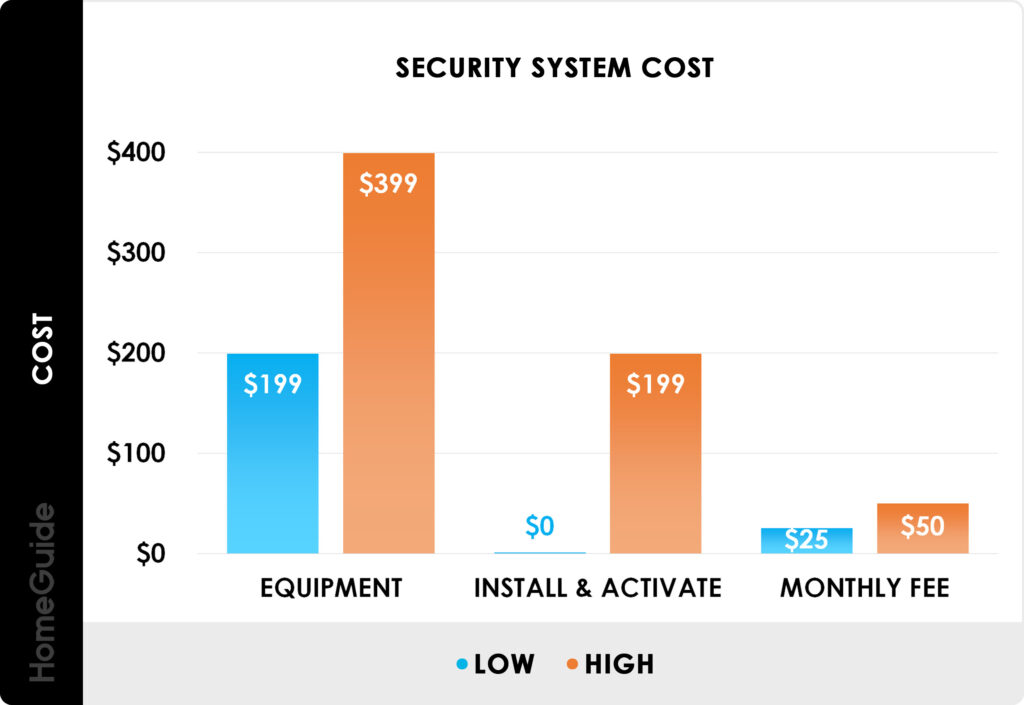
Motion Detectors
Motion detectors are designed to detect movement within a specific area and trigger an alarm or other actions when motion is detected. The cost of motion detectors can vary based on the type (passive infrared, microwave, or dual technology) and the level of sensitivity and range they offer. Basic motion detectors can range from $20 to $50 each, while more advanced models with additional features can cost upwards of $100 each.
Door and Window Sensors
Door and window sensors are essential components of a home security system as they detect unauthorized entry. These sensors are typically installed on doors and windows and trigger an alarm when they are opened or tampered with. The cost of door and window sensors can vary based on the type (magnetic, acoustic, or glass break) and the quantity required for your specific property. Basic sensors can range from $10 to $30 each, while more advanced models or those with additional features may cost more.
Smart Lights
Smart lights offer added security by allowing you to control and automate your lighting, creating the illusion of occupancy when you’re away from home. These lights can be programmed to turn on and off at specific times or in response to certain events, such as an alarm activation. The cost of smart lights will depend on the brand, type, and functionality. Basic smart bulbs can range from $10 to $20 per bulb, while smart lighting systems that include multiple bulbs and additional features can cost upwards of $100.
Understanding the Benefits Versus the Cost
Investing in a home security system comes with several benefits that outweigh the associated costs. Let’s explore some of the key benefits of having a home security system installed in your property.
Security and Peace of Mind
The primary benefit of a home security system is the added security and peace of mind it provides. Knowing that your home is protected by a reliable and comprehensive security system can alleviate anxieties and allow you to sleep better at night. Home security systems act as a deterrent for potential burglars and provide prompt alerts in case of any suspicious activity, ensuring a swift response to protect your home and loved ones.
Potential Insurance Discounts
Having a home security system installed can potentially lead to lower insurance premiums. Many insurance companies offer discounts for homes equipped with security systems, as they are considered lower risk. These discounts can help offset the cost of the system over time, making it a cost-effective investment in the long run.
Increasing Property Value
A home security system can also add value to your property. When it comes time to sell your home, having a professionally installed and monitored security system can be a selling point for potential buyers. The added security and peace of mind that come with a security system can make your property more appealing, potentially increasing its value in the eyes of prospective buyers.
Considerations for DIY Home Security Systems
While professional installation is recommended for ensuring proper installation and optimal performance of your home security system, there are some considerations for those who prefer a DIY approach.
Cost Savings
One of the primary motivations for choosing a DIY home security system is cost savings. DIY systems typically have lower upfront costs compared to professionally installed systems, as you can purchase the equipment and install it yourself. However, it’s essential to weigh the potential cost savings against the expertise required for installation and the potential risks involved.
Flexibility and Control
DIY home security systems offer homeowners greater flexibility and control over their security setup. You have the freedom to choose the specific components and features you want, as well as the ability to customize and expand the system at your own pace. DIY systems allow you to adapt your security setup based on your changing needs and preferences without relying on a third-party installer.
Installation Challenges
While DIY installation may seem straightforward, it’s important to be aware of the potential challenges involved. Installing a comprehensive home security system can be complex, especially for those without prior experience or technical knowledge. You may encounter difficulties with wiring, positioning of sensors, or system configuration. It’s crucial to carefully follow installation instructions and seek guidance if needed to ensure a successful installation.
Hidden Costs of Home Security Systems
In addition to the upfront purchase price and installation costs, there are hidden costs associated with home security systems that homeowners should be aware of. These costs often arise during the course of ownership and maintenance of the system.
Contracts and Termination Fees
Some security companies require customers to sign contracts when purchasing their systems. These contracts outline the terms and conditions of the service and often have a specified period, such as one or three years. If you decide to terminate the contract before its completion, you may be subject to termination fees. It’s important to carefully review the terms and conditions of any contracts before signing and be aware of any fees or penalties associated with early termination.
Battery Replacements
Many components of a home security system, such as sensors and control panels, rely on batteries for power. These batteries need regular replacement to ensure the continued operation of the system. The frequency of battery replacements will depend on the specific devices and their power requirements. It’s important to factor in the cost of battery replacements when budgeting for your home security system.
Upgrades and Add-Ons
As technology advances and new features become available, you may find yourself wanting to upgrade or add additional components to your home security system. These upgrades and add-ons can come at an additional cost. It’s important to consider the potential for future upgrades and expansions when selecting your initial security system to ensure compatibility and avoid any surprises down the line.
Money-saving Tips for Home Security Systems
While home security is a crucial investment, there are some money-saving tips you can consider to minimize costs without compromising on the security of your home.
Shop Around for Competitive Prices
Before making a final decision, it’s always a good idea to shop around and compare prices from various security companies. Different companies may offer different pricing structures and packages, allowing you to find the best deal that meets your budget and security needs. Be sure to consider the reputation and reliability of the security company as well to ensure you’re getting the best value for your investment.
Consider DIY Installation
If you have the necessary skills and knowledge, opting for a DIY installation can save you money on professional installation fees. Make sure to carefully follow the installation instructions provided and reach out to customer support if you need assistance. DIY installation can be a rewarding and cost-effective option if done correctly.
Opt for a Basic Package
If you’re on a tight budget, consider starting with a basic home security package that provides essential features and coverage. You can always expand and upgrade your system later as your needs and budget allow. By opting for a basic package initially, you can enjoy the benefits of a home security system without breaking the bank.
Buying Instead of Leasing Equipment
When selecting a home security system, consider purchasing the equipment outright instead of leasing it. While leasing may seem like a more affordable option upfront, it often involves long-term contracts and can end up costing you more in the long run. By purchasing the equipment, you have more control over its use, maintenance, and potential upgrades, allowing you to tailor the system to your specific needs without any additional leasing fees.
In conclusion, when considering a home security system, it’s essential to understand the different types available and the costs associated with installation and maintenance. Factors such as the size of your property, complexity of the system, and quality of the equipment can all affect the installation cost. Integrating home automation tools can enhance the security features of your system, but it’s important to consider the cost implications. Additional features such as surveillance cameras, motion detectors, door and window sensors, and smart lights can provide added security but come at additional costs. Understanding the benefits of having a home security system, potential insurance discounts, and increased property value can help justify the cost. For those looking for cost savings, DIY installation and considering basic packages or buying equipment instead of leasing are viable options. It’s important to be aware of hidden costs such as contracts, termination fees, battery replacements, and potential upgrades. By considering these factors and implementing money-saving tips, you can choose a home security system that suits your needs and budget while providing the peace of mind and security your home deserves.